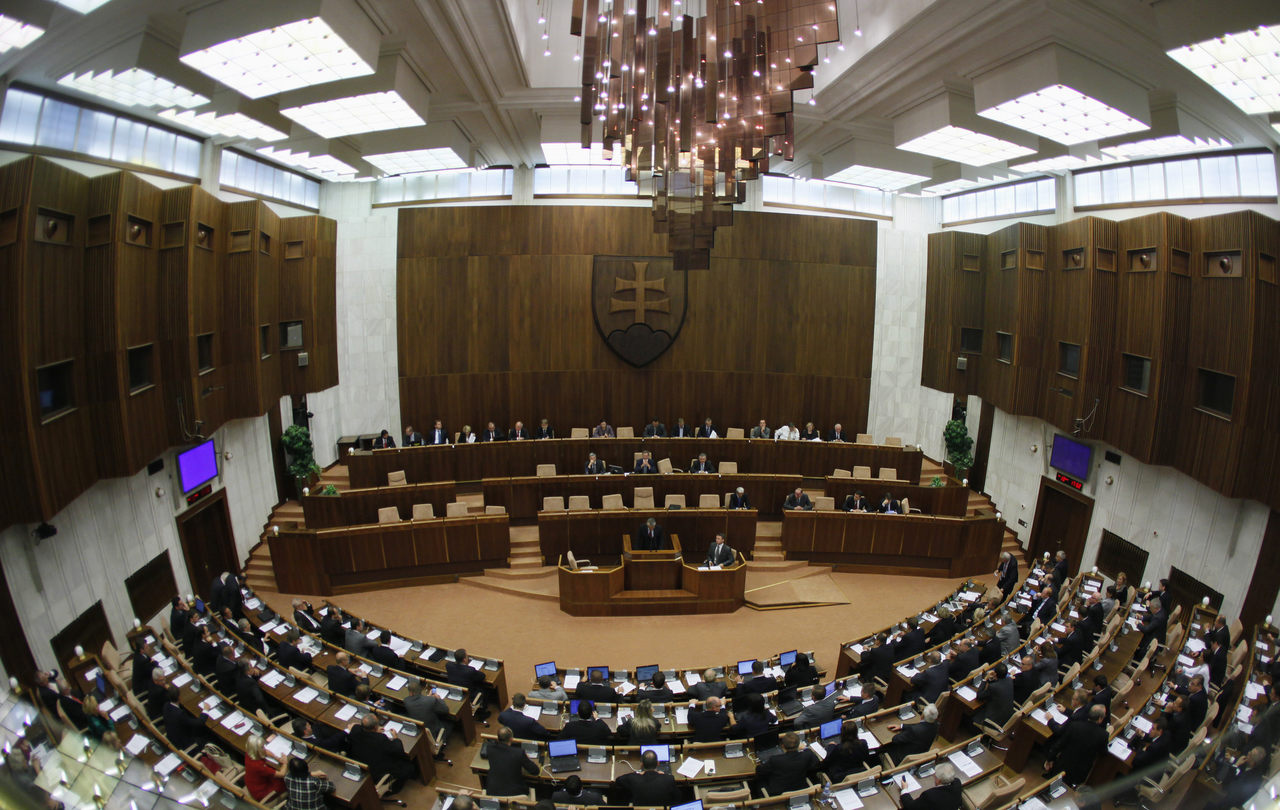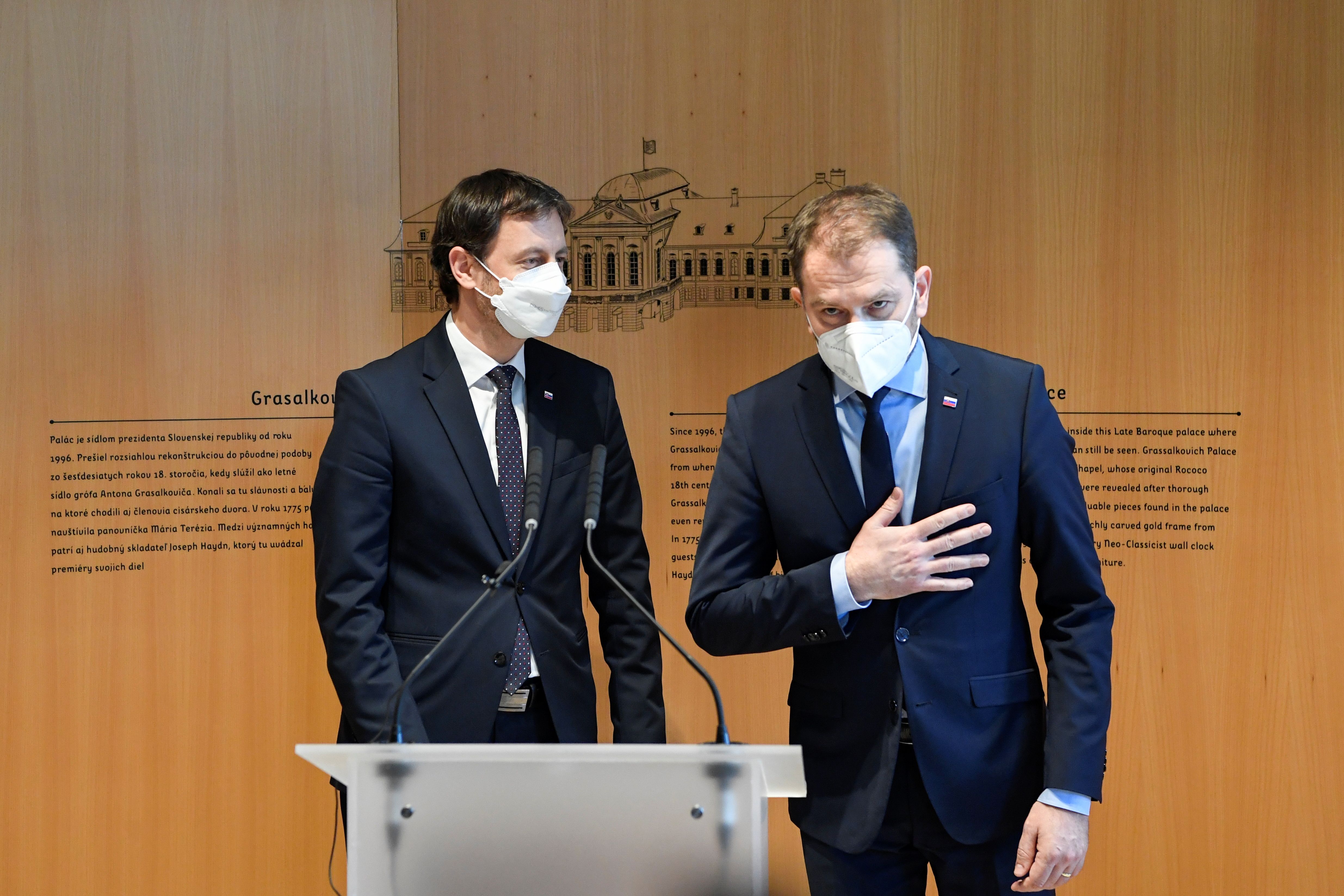A Drama in Many Acts: Slovak Government Dismissed
The vote of no confidence in the government of Eduard Heger in the Slovak National Council marks a decline in the power of the right-wing coalition held since March 2020. Changing the cabinet will be a long-term process and may be forced by early elections, the formation of an expert government, or regaining parliamentary support and re-swearing in a coalition government. The now-dismissed government will still be able to push through changes in domestic policy to a limited extent, but its involvement in international affairs will weaken.
 Petr Josek Snr / Reuters / Forum
Petr Josek Snr / Reuters / Forum
In a vote on 15 December 2022, initiated by the opposition parties Freedom and Solidarity (SaS) and Hlas–Social Democracy, 78 deputies out of 150 in the unicameral Slovak parliament supported a vote of no confidence in the government formed of three parties— Ordinary People and Independent Personalities (OĽaNO), We are Family and For People. It was preceded by SaS departure from the coalition in September last year, which until then also had a constitutional majority. The government, however, continued to function as a minority and pushed through laws thanks to the support of non-attached deputies. The loss of their support, though, and as a result the dismissal of the government was caused by, among others, that Finance Minister Igor Matovič proved unreliable by withdrawing his resignation despite handing it to President Zuzana Čaputová.
The Collapse of the Government
The cause of the split in the coalition was the growing programmatic and personnel disputes between the leaders of the two largest parties forming the government at the time, Richard Sulík (SaS) and Matovič. The dismissal of the latter as prime minister and the swearing-in of Heger, who is considered to be more conciliatory, in April 2021 did not guarantee the long-term stability of the government. Behind both the departure of the economically liberal SaS from the coalition and its support for the vote of no confidence was criticism of the government’s social policy, which in its opinion was too generous, as seen in May last year when enacting financial aid for families with children.
The dissipation of the coalition’s political capital also contributed to the dismissal of Heger’s cabinet. It was based on public approval of the four ruling parties—in the parliamentary elections in 2020, they won a total of 45.3% of the votes—and initially friendly cohabitation with President Čaputová, who over time openly criticised the political disputes and vetoed some reforms, among other actions. Heger’s government also failed to take advantage of the opposition’s divisions. After Smer–Social Democracy lost the last parliamentary elections in February 2020, a new party, Hlas, was formed from some members of Smer, and another party, Republika, emerged from the far-right People’s Party Our Slovakia. Moreover, the increasingly radical Smer and Republika managed to inflame the political dispute in their favour and weaken the coalition by working together in parliament and exploiting international issues, such as migration (by demanding restrictive policies) and the war in Ukraine (adopting a pro-Russian narrative).
The mounting economic and energy challenges, including the increasing energy prices and high inflation, which in November reached 15.4% year on year, weakened the public’s confidence in the government parties and led to more inter-party friction. To remedy the effects of the rising energy prices, Heger’s cabinet adopted a special package just before the vote of no confidence, counting on undecided deputies. In turn, the adoption of the 2023 budget, although burdened with a deficit of 6.4% of GDP, served to calm investors and businesses. According to the forecasts of the European Commission, Slovakia’s deficit will be the second-highest in the EU, behind Belgium. The adoption of the budget, though, shows that Heger, despite his cabinet’s resignation, is still able to reach compromises with some of the opposition.
The Aftermath of the Cabinet’s Resignation
In Slovakia, the constitution limits the powers of a dismissed government and transfers them to the head of state. Until a new cabinet is appointed, the approval of the president is needed for the adoption of key decisions by the government.
The dismissal of the government deepened the leadership crisis in the largest parliamentary grouping, OĽaNO. As a protest against Matovič as party leader, 10 deputies left. This will not help to rebuild public trust in this party, which polled at 7.4% in a survey on 21 December by the FOCUS agency, a steep drop from the 25% in the last parliamentary elections.
Despite the resignation of the government, the main directions of Slovakia’s foreign policy will remain. They were not modified after SaS left the government, although this involved a change of foreign minister—Ivan Korčok was replaced by Rastislav Káčer. Heger’s dismissed cabinet will continue to support Ukraine, which was one of the determinants of his foreign policy. The dismissal of the government also should not affect Slovakia’s presidency of the Visegrad Group, which will last until mid-2023. However, it is characterised by low activity, although in 2018, meetings at the level of prime ministers were resumed, and in December, of foreign ministers (the stoppage was caused by the partners’ crisis of confidence in Hungary due to its stance on the war in Ukraine).
Multiple Scenarios
The dismissal of the government does not automatically mean early elections. For them to take place, it is necessary to adopt special laws by a qualified majority of 90 deputies. President Čaputova’s intention is to adopt the measures by the end of January and hold elections in the first half of next year, which she sees as a move towards political stabilisation. This process may be facilitated by a referendum planned for 21 January, which was organised mainly on the initiative of Smer, which collected the required number of signatures of eligible citizens. If a majority votes for shortening the term of office of the National Council, deputies will be able to vote by a simple majority for early elections.
If the term of office will not be shortened by the parliament, the president may nominate a new candidate for prime minister and attempt to form an expert cabinet. However, it is doubtful that this cabinet would gain a vote of confidence in the National Council. Meanwhile, Matovič’s departure from the government, which was a condition for SaS support for the budget bill for the new year, makes it probable that cooperation in forming the government will resume during the current parliamentary term. Thus, it is possible to reactivate Heger’s minority cabinet or even recreate a four-party coalition. The SaS calculations also could support such a scenario, as after leaving the government it fell significantly in polls from a dozen or so percent in the summer of 2022 to 5.6% in December.
If early elections were held with the current support maintained, power would most likely be taken over by a coalition led by Hlasu (19%), led by Petr Pellegrini, the most popular politician among party leaders and prime minister in 2018-2020. Hlas has broad coalition capacity, including cooperation with Smer (16.6%). In turn, this party has been rebuilding its support for two years by, among others, the discontinuation of proceedings against former Prime Minister Robert Fico and Minister of the Interior Robert Kaliňák. They were accused in April last year of leading an organised criminal group whilst in the cabinet they both co-created until the murder of an investigative journalist that led to snap elections. Hlas could also co-rule with We Are Family (8.2%) and with the liberal Progressive Slovakia (12.8%), which consolidated its position after the local and regional elections in October last year and by retaining the post of the Bratislava president (mayor). Republika (6.9%) and the Christian Democratic Movement (5.9%) would also win enough votes to enter the National Council.
Conclusions and Recommendations
The dismissal of Heger’s cabinet, the culmination of disputes between right-wing parties, confirmed the fragility of the functioning minority cabinet. This translates into higher dynamics on the Slovak political scene and uncertain prospects in forming the next cabinet. It is forcing the political class, including the ruling parties, to focus on an election campaign, also in case elections take place in 2024 on the originally planned date. However, if the ongoing negotiations to reactivate Heger’s government fail, the scenario of early elections is most likely.
The vote of no confidence in the Slovak government pushes its actions in foreign policy to the background. However, this should not matter for further support (including military aid) for Ukraine, thanks also to the adoption of a new budget. For Slovakia’s partners, including Poland, the dismissal of the government may make it more difficult to organise joint initiatives, such as intergovernmental consultations, which were successfully resumed in 2022. At the same time, President Čaputová can be expected to increase her international activity as her perception of Russia’s aggression against Ukraine coincides with Poland’s.




